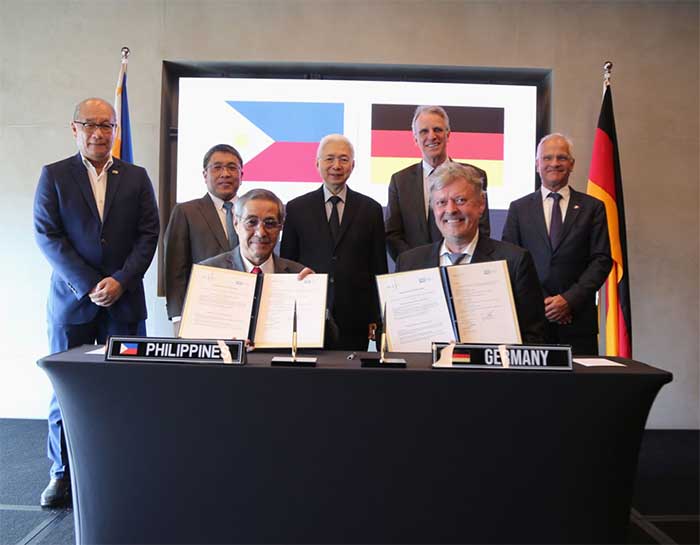
By Francis Allan L. Angelo
In a pivotal moment for Philippines-Germany relations, leaders from both nations gathered for the signing of a Memorandum of Understanding (MOU) to fortify economic ties.
The agreement, aimed at enhancing vocational education and promoting technological advancement in the construction industry, underscores the burgeoning partnership as both countries celebrate a surge in investments and cooperative ventures.
The ceremony, hosted in Manila City, saw PCA Executive Director Engr. Ibarra Paulino and BFW represented by GPCCI Executive Director Mr. Christopher Zimmer solidify their commitment to progress and innovation.
Alongside them, a cadre of dignitaries including PCA President Engr. Ronaldo R. Elepaño Jr., DTI Undersecretary Allan B. Gepty, DTI Secretary Fred Pascual, BMWK Parliament State Secretary Stefan Wenzel, and Ambassador Andreas Pfaffernoschke, lent their support, underscoring the importance of this cross-continental collaboration.
At the heart of the 2nd Joint Economic Commission (JEC) meeting, the Philippines and Germany not only celebrated a record USD 149.89 million in German FDI—the highest since 2005—but also marked the Philippines as a strategic ASEAN hub for German businesses. This economic windfall has been fueled by priority areas of cooperation, spanning energy, infrastructure, IT-BPM, and more.
Reflecting on the meeting’s outcomes, Secretary Pascual remarked on the PHP 393.99 billion in foreign-approved investments from Germany, while business giants from both countries discussed furthering their mutual economic interests. Representatives from leading Filipino and German corporations and government agencies signaled their readiness to deepen ties.
A key element of this renewed partnership is the advancement of the German Dual-Training System in the Philippines, showcasing Germany’s leading role in vocational training. This educational model promises to bring German technological prowess to Filipino shores and foster an exchange of best practices.
The commitment to collaboration didn’t end with education and technology. A spotlight was placed on the Philippines’ potential in renewable energy, with companies like wpd AG acknowledging significant opportunities, and the DOE advocating for establishing a local manufacturing base for renewable energy components.
Philippine government agencies showcased their willingness to embrace these collaborative projects, aiming to propel the Philippines Construction Industry Roadmap (PCIR) 2020-2030 and bolster the local construction workforce’s capabilities.
The discussion also ventured into the crucial area of minerals processing, with the Philippine government presenting a robust case for investment and technical cooperation to establish an iron-making facility.
Updating on joint initiatives, DTI’s Undersecretary for Competitiveness and Innovation Rafaelita M. Aldaba highlighted the ongoing projects with Siemens and Start2 Group to revolutionize the local startup landscape and integrate Industry 4.0 practices.
Amidst this environment of shared ambition and strategic planning, the Philippines stands out as Southeast Asia’s fastest-growing economy, with an impressive 5.6% growth rate in 2023. The Philippine Development Plan (2023-2028) aims to further this trajectory by positioning the country as an investment hotspot, particularly in sectors aligned with ESG principles.
Germany, seeking to mitigate risks associated with global supply chain vulnerabilities, sees the Philippines as a vital diversification partner. The JEC’s success signifies a milestone in bilateral relations and paves the way for a collaborative future aimed at achieving inclusive and sustainable growth for both nations.





















